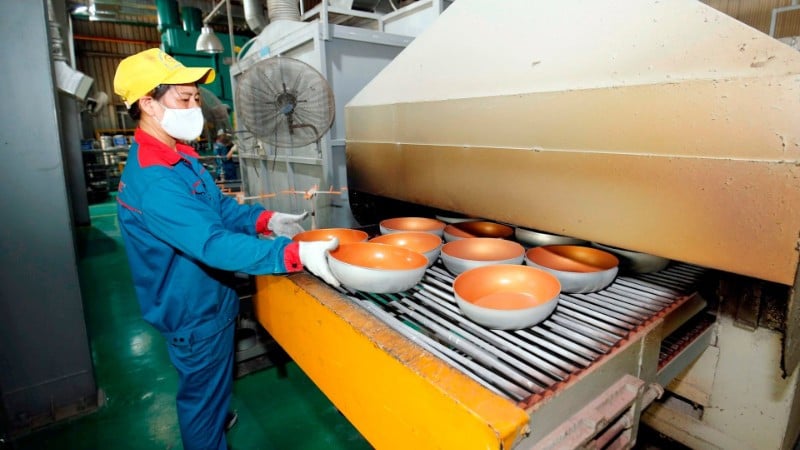
Capacity building for fast-moving consumer goods enterprises is also a driving force to promote consumption and domestic market growth, contributing to economic development and job creation.
Digital consumption trends
The technology boom or the "hot" growth of e-commerce,... are strongly affecting the consumer market. According to the Ministry of Industry and Trade , from 2021 to now, the total retail sales of fast-moving consumer goods have increased by an average of 6% per year, demonstrating the stable and increasing purchasing power of consumers.
Fast-moving consumer goods have a short shelf life, low profit margins but fast turnover, and are often sold in large quantities, helping manufacturing and retail businesses to have a continuous cash flow. Therefore, many businesses in the industry have taken advantage of market opportunities to expand their business scale. However, this is also a highly competitive industry, with both large and small businesses having to constantly compete on price, quality, and service. Not only that, this industry is also very sensitive to the market, reflecting changing consumer trends.
Head of E-commerce at Lotte Mart Vietnam, Dao Thanh Tung, said: E-commerce has become a core component of the modern retail industry. In 2024, Vietnam's e-commerce market grew by more than 22%, the second fastest in Southeast Asia, and is expected to account for 10% of total retail sales in 2025. The Internet and digital platforms have become important references for consumers to compare prices and evaluate product quality. E-commerce not only changes consumer behavior, but also reshapes the entire retail ecosystem, becoming a strategic driving force for businesses to develop sustainably and compete in the digital age.
According to Ms. Tran Dieu Huong, Department of Domestic Market Management and Development (Ministry of Industry and Trade), large e-commerce platforms such as Shopee, Lazada, and Tiki have now become familiar shopping channels for urban consumers. In addition, according to a survey, 73% of urban consumers search for information online before making a purchase. Multi-channel retail models, integrating cashless payments, are also being actively deployed by fast-moving consumer goods businesses.
Consumers can shop through many different channels such as physical stores, websites, mobile applications, etc. O2O (Online to Offline - combining online and offline sales methods) or BOPIS (Buy Online, Pick Up In Store - buy online, receive goods at the store) models are also becoming more and more popular in big cities. These new business models help consumers save time and shipping costs.
Synchronize support
Based on her experience in supporting fast-moving consumer goods businesses in applying digital transformation, Lazada Vietnam Operations Director Doan Trang Ha Thanh said: Digitalizing the distribution system not only helps businesses shorten processing time and reduce operating costs, but also improves market access, especially for products with short shelf life such as fresh food. From there, businesses will have the opportunity to expand their scale and improve their competitiveness on digital commerce channels.
Digitalizing the distribution system not only helps businesses shorten processing time and reduce operating costs, but also improves market access, especially for products with short shelf life such as fresh food. From there, businesses will have the opportunity to expand their scale and improve their competitiveness on digital commerce channels.
Lazada Vietnam Operations Director Doan Trang Ha Thanh
Therefore, fast-moving consumer goods businesses should proactively promote digitalization of operations in logistics, warehousing and order processing; invest in building sustainable operational capacity on digital platforms; increase sales via livestream and participate in the "Mega Sales" program organized by e-commerce platforms to expand distribution channels.
Regarding policy, Ms. Thanh recommended that the State continue to prioritize promoting and introducing e-commerce as an important economic development channel; organize large-scale e-commerce supply-demand connection programs; and create more favorable development conditions for cross-border e-commerce, especially in the agricultural and food sectors.
According to Ms. Tran Dieu Huong, Resolution No. 57-NQ/TW of the Politburo on breakthroughs in science and technology development, innovation and national digital transformation has identified digital transformation as a strategic breakthrough, promoting the application of digital technology, artificial intelligence (AI), and big data in distribution and supply chain management. Resolution No. 68-NQ/TW of the Politburo on private economic development also expands access to credit, land, and technology for the business community, including retail and fast-moving consumer goods manufacturing enterprises.
“It is important that support solutions in the coming time need to be synchronous in terms of institutions, infrastructure and technology, creating a favorable business environment, promoting the development of the fast-moving consumer goods industry to become a driving force for sustainable domestic growth. Specifically, the State continues to perfect the legal framework for sales models such as O2O, livestream or multi-platform e-commerce; build a clear and transparent legal framework to protect the rights of consumers and businesses,” Ms. Huong commented.
At the same time, the State invests in developing a modern logistics system, with cold storage facilities to preserve fresh goods, creating conditions to promote domestic e-commerce. For businesses, it is necessary to deploy more credit support solutions, provide preferential loans; develop human resources through training courses on digital technology and business administration, etc.
Source: https://nhandan.vn/ung-dung-so-trong-nganh-hang-tieu-dung-nhanh-post893258.html


![[Photo] Editor-in-Chief of Nhan Dan Newspaper Le Quoc Minh received the working delegation of Pasaxon Newspaper](https://vphoto.vietnam.vn/thumb/1200x675/vietnam/resource/IMAGE/2025/9/23/da79369d8d2849318c3fe8e792f4ce16)

![[Photo] The 1st Congress of Party Delegates of Central Party Agencies, term 2025-2030, held a preparatory session.](https://vphoto.vietnam.vn/thumb/1200x675/vietnam/resource/IMAGE/2025/9/23/e3a8d2fea79943178d836016d81b4981)
![[Photo] General Secretary To Lam meets voters in Hanoi city](https://vphoto.vietnam.vn/thumb/1200x675/vietnam/resource/IMAGE/2025/9/23/d3d496df306d42528b1efa01c19b9c1f)

![[Photo] Prime Minister Pham Minh Chinh chairs the 14th meeting of the Steering Committee on IUU](https://vphoto.vietnam.vn/thumb/1200x675/vietnam/resource/IMAGE/2025/9/23/a5244e94b6dd49b3b52bbb92201c6986)


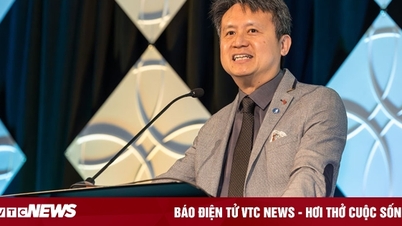









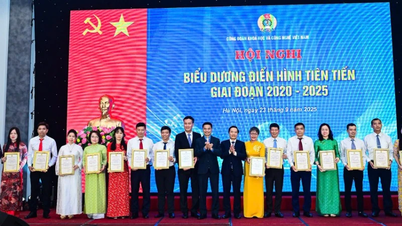

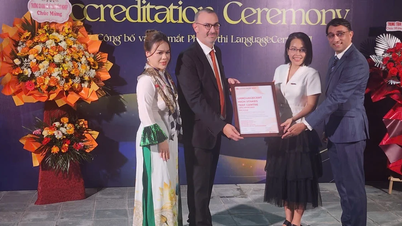


![[Photo] Editor-in-Chief of Nhan Dan Newspaper Le Quoc Minh received the working delegation of Pasaxon Newspaper](https://vphoto.vietnam.vn/thumb/402x226/vietnam/resource/IMAGE/2025/9/23/da79369d8d2849318c3fe8e792f4ce16)





























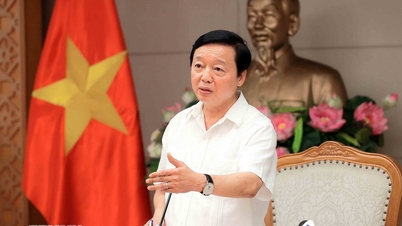












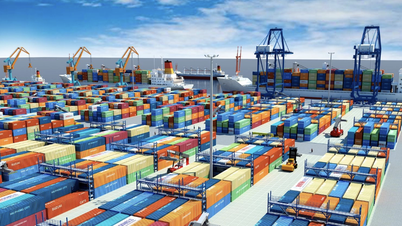

























Comment (0)